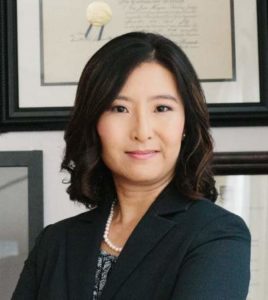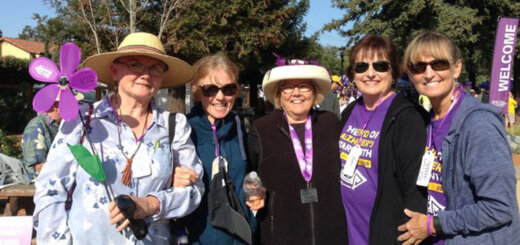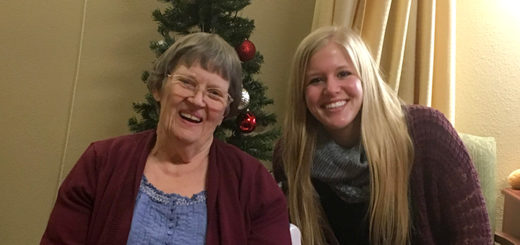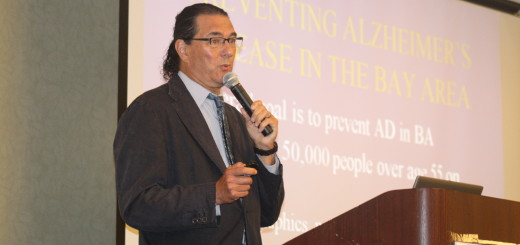Attorney volunteers to teach families about legal planning
Conducting online research about Alzheimer’s disease led attorney Vivian Yuan of San Jose to become a volunteer with the Alzheimer’s Association. Handling the estate for a family member who refused to create a plan has increased her passion for helping others learn the importance of early planning.
The value of early planning
One of the benefits of getting an early diagnosis of Alzheimer’s or another dementia is the ability to conduct legal and financial planning. This allows the person living with dementia to express their wishes for future care and decisions.
As an estate planning attorney, Vivian Yuan has witnessed the value of early planning for the clients she serves. But a recent death in the family has given her a first-hand look at what happens when individuals don’t create a will or other legal documents.
How she came to volunteer
Vivian has had a diverse career in the legal field, working as an attorney for the New York City Police Department, a boutique estate planning firm, an accounting firm and an investment bank. Over 10 years ago, she took a position at eBay and moved to California. Three years ago, she started her own law firm focusing on tax and estate planning for families and business owners.

Around the time she started her firm, a family member in another state was diagnosed with Alzheimer’s. As Vivian sought to educate herself about the disease, she found the Alzheimer’s Association.
“I was impressed with the Alzheimer’s Association website,” shared Vivian, “including the depth of knowledge and how much information was available.” While on the website, she came across information on volunteer opportunities and reached out.
Finding her niche
Vivian enjoys speaking to others. With a background in estate planning, she was a natural to present the Alzheimer’s Association education program on legal planning.
Vivian has also learned to give talks on brain health and an overview of the Alzheimer’s Association. Besides giving workshops in English, Vivian is also able to speak to audiences in Chinese.
One of Vivian’s most memorable presentations was for a group of caregivers. “That was the most emotional experience,” Vivian shared. “They have a lot more experience connecting with the person living with dementia than I do. They taught me – it was very impactful.”
Sharing personal experience
Vivian acknowledged that her own experiences have changed how she presents the legal planning workshop. When she first started volunteering, she focused on the legal terms and materials. But a recent personal experience has caused her to add more stories into her talk.
In January, a family member passed away. Vivian had spoken to him about legal planning in the past, but a mental health condition caused him to resist planning. As Vivian helps his family settle the estate, the value of legal planning has become more personal for her.
Due to the lack of advance planning, the estate is subject to probate. Probate is the process used by the court to pay off debt and distribute the property of a person who has died. This time-consuming and costly process has been further delayed because the family member’s do-it-yourself will was laden with errors and vagueness.
He also didn’t sign a legal release that would have given family members the right to access his medical records after his death. As a result, the family is not able to work through billing issues with the medical provider until the legal representative has been appointed. This has caused more frustration for the family.
Vivian has found that most people don’t know that they can sign a HIPAA release to authorize medical providers to release medical and billing information to their loved ones, effective when the person becomes incapacitated and after death. This release would have been helpful for Vivian’s family.
In her recent workshops, Vivian has shared her family’s story as an example of what problems can arise when someone hasn’t planned in advance. “A lot of times it’s easier to tell them stories,” Vivian said, “then they can relate.”
What participants learn
Vivian enjoys connecting with the audience and hearing their “aha” moments, where they realized something they needed to do in their situation.
Vivian has heard feedback from participants that before her attending her presentation, they didn’t know:
- Advance estate planning should plan for illness as well as death
- The value of Advance Health Care Directives & HIPAA releases.
- A power of attorney terminates when a person dies.
- If a person dies without a will, the laws of the state where the person resided control who inherits their property.
- To have a say in who inherits one’s property, they must express it clearly in a will.
- Even with a will, the estate may still have to go through probate, depending on the value of the estate.
- If they use generic store-bought or downloadable documents, they need to make sure the language in the documents is in compliance with their state law.
Importance of planning early
While legal planning is important for all adults, it is even more important when someone is diagnosed with Alzheimer’s or a related disorder. In this case, “the importance of early planning is not just to put your words in writing,” said Vivian. “Alzheimer’s is a disease where your legal capacity will decline over time. The best thing is to plan ahead of time or as soon as you’re diagnosed.”

In her professional role, Vivian has seen families miss the opportunity to plan. A few years ago, a man in his 80s met with her, but never followed up to develop a plan. Last month his son called Vivian.
The son said that his father had had a stroke and now has dementia-like symptoms. His father’s bills are piling up and decisions need to be made.
The son had found Vivian’s card in his father’s files. He wanted to see if Vivian had his father’s estate planning documents. Sadly, she had to tell him that his father had not created a plan.
His father no longer has the capacity to make his own decisions. Without the legal authority to make decisions for his father, the son has to go to court to seek conservatorship. This would allow him to take responsibility for his father’s care and finances.
Vivian shared that this process can be expensive, requires a lot of steps and can take a long time. This is especially true if family members aren’t in agreement.
State-specific documents
In the workshop, Vivian is able to explain the various documents and how they are used. She also discusses the importance of making sure that people know the rules for that particular state.
For example, in Nevada, if the deceased person’s assets exceed $20,000, or if there is real estate involved, probate is normally required. In California, if the person had a gross estate over $150,000, the estate could be subject to probate.
Vivian shares information on living trusts, which offer a way for people to give instructions for how their estate should be handled upon death. Depending on state law and a person’s circumstances, a living trust may allow an estate to avoid probate.
Make sure documents are valid for your situation
Sometimes people seek low-cost or online resources to help with planning. Vivian cautions individuals to ensure that the language in the forms match the laws for their state and achieve what the individuals wants to achieve. Vivian noted that “a document that worked for someone else may not work for you.”
Vivian met with a family that wanted to do estate planning for their father, who had Alzheimer’s. A daughter had previously obtained power of attorney for her father. But the language in the document that she downloaded was broad and didn’t match the specific language required by California law related to creating an estate plan.
Interacting and sharing stories
Vivian has found her volunteer experience to be “very gratifying.” Sometimes attendees will talk with Vivian about their personal situation at the end of the workshop. Based on their conversations, Vivian says, “I know that I was able to reach them.”
Participants in the legal and financial planning workshops echo Vivian’s comments on how attending the workshop helps them. Here are a few comments from participant evaluations:
- “Very important planning information – love the handouts”
- “Easy to follow with great printed format to follow and take notes. Very helpful for my needs”
- “Very informative – able to create a ‘to-do’ list!”
Unexpected return from volunteering
When Vivian started volunteering, she did it because she saw that the Alzheimer’s Association had a need and she wanted to help out. She didn’t think about how she might benefit.
“I’m surprised at how meaningful it has been to me,” shared Vivian. She has been moved by the stories she has heard from caregivers. “It enriches me as a person by connecting with others.”
It has also helped her professionally. “The audience asks questions I haven’t considered,” Vivian has found. “When I finish a presentation, I think about it for a while. When a client comes in, they may ask similar questions.”
Encouraging others to volunteer
Through her volunteer efforts, Vivian is able to tell individuals how legal planning can help persons living with Alzheimer’s ensure that their wishes are followed. This can also ease the burdens on their caregivers. She hopes that families will take the lesson to heart and create (or update) their legal plans.
Vivian encourages others to consider volunteering for the Alzheimer’s Association as a community presenter. “If you like presenting, it”˜s a great way to connect with people,” Vivian said. And you don’t need to be an attorney. “There are many topics available that you can learn to present.”
Learn more:
Here are a few of our upcoming free legal and financial planning workshops. You can find more educational programs at alz.org/norcal/events.
Legal and Financial Planning for Alzheimer’s Disease
Thursday, June 6, 2019
10 a.m. – 12 p.m.
Roseville Police Department, Social Services
1051 Junction Blvd., Roseville, CA 95678
Contact: 800.272.3900
Email: ivilleda@alz.org
Legal Planning for Alzheimer’s
Sunday, June 23, 2019
3:15 – 4:15 p.m.
Jewish Community Center, Fisher Family Hall
3200 California St., San Francisco, CA 94118
Contact: Shiva Schulz, 415.292.1260
Email: sschulz@jccsf.org
Legal Planning for Alzheimer’s
Wednesday, July 10, 2019
11 a.m. – 1 p.m.
CPMC Davies Auditorium
Castro & Duboce, San Francisco, CA 94114
Contact: Rachel Main
Email: rmain@alz.org
Financial Planning for Alzheimer’s
Wednesday, July 17, 2019
11 a.m – 1 p.m.
CPMC Davies Auditorium
Castro & Duboce, San Francisco, CA 94114
Contact: Rachel Main
Email: rmain@alz.org
Financial Planning for Alzheimer’s Disease
Thursday, July 25, 2019
1:30 – 3 p.m.
Palo Alto Medical Foundation, Main Building, 3rd Floor, Jamplis Rooms BCDE
795 El Camino Real, Palo Alto, CA 94301
Contact: Rochelle Rice, 650.853.2960
Email: BreymaR@sutterhealth.org

















